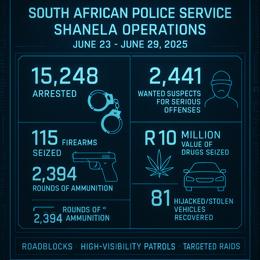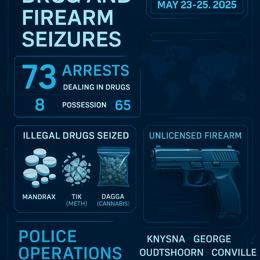Image created by AI
South Africa's New Dawn on Corruption: NPA's IDAC Becomes a Permanent Unit
The battle against corruption in South Africa reaches a significant milestone as the Investigating Directorate Against Corruption (IDAC) now stands as a permanent and fully-fledged unit within the National Prosecuting Authority (NPA), following its initial establishment in 2019. Born out of the grim findings of the Zondo Commission, which unearthed complex corruption cases, the IDAC's inception was a tactical move to intensify the NPA's ability to confront high-profile and intricate crimes that have hindered the nation's progress.
President Cyril Ramaphosa's legislative amendments have empowered IDAC with broader investigative capabilities, an essential step to enable working in concert with the Zondo Commission and embarking on independent probes. The significance of this moment cannot be overstated, as the establishment of IDAC marks a pivotal point in South Africa's commitment to eradicating the blight of corruption that has long plagued its governance.
The operational power of this directorate has been dramatically enhanced. With the enactment of the NPA Amendment Act and accompanying regulations, IDAC now wields full police authority, setting the stage for influential and autonomous criminal investigations. The proclamation of IDAC as a mainstay within the NPA fortifies its capacity with a formidable arsenal of dedicated and skilled law enforcement officers, forensic experts, and specialist investigators.
The ANC has applauded this development as a decisive maneuver to invigorate law enforcement and sustain rule of law, conveying optimism for the reinforced anti-corruption framework and the potential restoration of public trust in democratic institutions. These sentiments are echoed by the NPA, which envisions IDAC's role in enacting the prosecution-led model and enabling close collaboration with the NPA's Asset Forfeiture Unit to tackle the financial underpinnings of corruption.
However, beneath the surface of these hopeful outlooks lies a well of skepticism. Advocate Paul Hoffman SC critically assesses the creation of IDAC as falling short of the Constitutional Court's specified standards of independence as set forth in the landmark Glenister v President of RSA judgment. His concern points to an uncomfortable history where the independence of anti-corruption bodies, like the Hawks and even the NPA itself, have been persistently cast into doubt.
In Hoffman's view, IDAC could falter constitutionally due to its non-compliance with the requirements of genuine autonomy, as articulated in the Glenister judgment. This skepticism is compounded by the possibility of IDAC falling prey to political whimsy, potentially allowing for its dissolution similar to the fate of the Scorpions in 2009 under former President Jacob Zuma's term—a scenario that could play out should a leader with similar inclinations to Zuma rise to power.
The dialogue surrounding IDAC now centers on whether it can uphold its claim of permanence and efficacy in a political environment that has seen independent institutions systematically weakened or abolished. The lingering question is whether situating IDAC within the Constitution's Chapter 9 framework, thereby affording it a degree of insulation from executive influence and opportunistic disbandment, could be the safeguard required for South Africa's earnest crusade against corruption.










